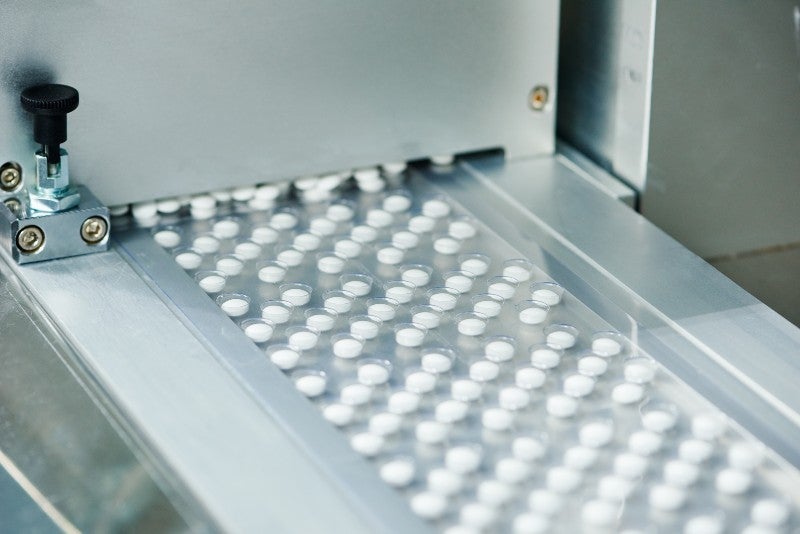
With the ever-rising costs of bringing a drug to market, pharmaceutical companies are increasingly looking at how they can improve the efficiency of their entire product development and drug commercialisation process. A well-known source of bottlenecks, delays, and technical setbacks is process scale-up, where production moves from the laboratory to full-scale GMP manufacturing.
Due to a range of unique rheological challenges, scale-up has been particularly difficult for manufacturers of solid-dose pharmaceuticals. According to Quentin Boulay, product marketing manager at MEDELPHARM: “A powder doesn’t flow the same on R&D equipment as on the big tablet presses. It can have an impact on the weight uniformity, leading to rejection of tablets.”
The same applies with the homogeneity of the mix, he adds. Segregation may be more likely to occur in a blend weighing hundreds of kilograms, which impacts content uniformity. “You could have tablets with too much API and other tablets with not enough. It means that the dissolution will be completely out of spec.”
Tablet defects
During compression, tablet properties might be the next thing to alter. This is often caused by the high compression speeds of industrial rotary presses, as well as a range of other changing parameters. There is likely to be a greater mechanical stress at ejection, for example, which leads to defects like lamination and capping if lubrication is insufficient. Too much lubrication, however, and there can be issues with disintegration. Even changes in the ambient conditions of the manufacturing environment are known to cause common tablet defects such as sticking and picking.
Raw ingredients themselves may also behave differently at this stage, says Ingrid Coyle, MEDELPHARM’s director corporate business development and communication. “When you manufacture a couple of grams of API versus hundreds of kilos, the quality of the raw materials you use may not necessarily be the same. There is a risk for variation between batches.”
“It could also lead to different elastic recovery after the tableting,” she continues. “This means that a tablet could expand after a few days and be subject to defects even inside the blister. It is dependent on the raw material and the API, the quality of which can be very different depending on whom you source it from.”
And these are just a few of the surprise challenges that a manufacturer might face during scale-up. This important stage of the drug’s lifecycle can be very time-consuming for pharmaceutical companies. Any issues will need to be fixed with new process parameters, a new process step, or even new equipment.
If it’s a problem with the formulation, companies may be forced to reduce the compression speed, leading to a loss of productivity. Without such actions, they risk whole batches being rejected by quality control. In the worst-case scenario, they might have to go back to the lab to adjust the formulation – a situation the entire industry hopes to avoid.
Moving away from trial and error
Too much of production scale-up involves an inefficient, iterative approach to solving unforeseen issues – a trial and error methodology, in other words, which naturally affects a company’s bottom line. Certain challenges, like those related to the flowability of the blend, can only be tackled this way. Fortunately, for most others there are a range of technologies and tools available to help companies prepare a successful scale-up from the R&D stage.
Compaction simulation is arguably the most important when dealing with oral solid dosage forms. Developed by tableting instrument company MEDELPHARM, the STYL’One Evo compaction simulator is a unique piece of equipment that gives formulation experts and process developers the critical information they need to pre-empt scale-up problems from the laboratory. The single-punch tableting press enables drug developers to test formulations at full production speed, replicating the parameters of all types of industrial rotary press.
“With a compaction simulator, we can foresee all tablet defects because we work at production speed,” says Boulay. “If we have a tablet defect on the compaction simulator, we can identify it, solve it, and then move to the scale-up phase without risk.”
Mitigating the risks of pharmaceutical scale-up is, according to Coyle, exactly what MEDELPHARM’s machines are designed for. As a further example, the company also offers instruments for screening excipients. “The problem might be lying in different excipients or different quality of excipients, and we can conduct a very quick screening and analysis of this material,” she explains.
Data of this kind is essential for what Boulay calls ‘product knowledge.’ Asked about his advice for pharmaceutical companies approaching scale-up, he believes the future should be all about Quality by Design (QbD). “The key is to design a really robust formulation using valuable data to master the variation of raw material or processes. We provide a lot of data that gives information, and information gives product knowledge.”
As the pharmaceutical industry moves away from troubleshooting towards a more efficient, QbD approach, the STYL’One Evo is the tool all R&D specialists need to secure their product’s scale-up and produce consistently high-quality tablets. Catering to the full needs of the pharmaceutical industry, the technology is now available in a compact, bench-top form, as well as in OEB3 and OEB5 formats.


